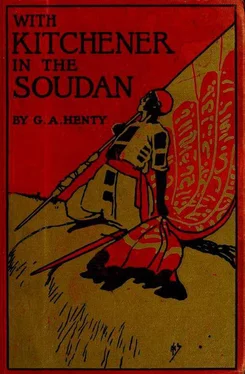By this time the reinforcements from home were all at Cairo, and their stores had already been sent up. It was arranged that they Avere to come by half-battalions, by squadrons, and by batteries, each one day behind the other. To make room for them, two Egyptian battalions were sent up to the foot of the Shabluka cataract. The six black battalions left Berber on July 30th, and arrived at Atbara the next day.
There were now four brigades in the infantry divisions instead of three, two battalions having been raised from the Dervishes taken at the battle of Atbara. These were as eager as any to join in the fight against their late comrades. This was scarcely surprising. The Baggara, the tyrants of the desert, are horsemen. The infantry were for the most part drawn from the conquered tribes. They had enlisted in the Khalifa's force partly because they had no other means of subsistence, partly from their innate love of fighting. They had, in fact, been little better than slaves; and their condition as soldiers in the Egyptian army was immeasurably superior to that which they had before occupied.
Broadwood, with nine squadrons of Egyptian cavalry, was already on the western bank of the river opposite Atbara, and was to be joined at Metemmeh by the camel corps and another squadron of horse from Merawi. On the 3rd of August the six Soudanese battalions left Fort Atbara for the point of concentration a few miles below the cataract. To the sides of each gun-boat were attached two of the steel barges; behind each were two native craft. All were filled as tightly as they could be crammed with troops. They were packed as in slavers, squatting by the side of each other as closeby as sardines in a box. The seven steamers and the craft they took with them contained six thousand men, so crowded that a spectator remarked that planks might have been laid on their heads, and that you could have walked about on them, while another testified that he could not have shoved a walking-stick between them anywhere. White men could not have supported it for an hour, but these blacks and Egyptians had a hundred miles to go, and the steamers could not make more than a knot an hour against the rapid stream, now swollen to its fullest.
While they were leaving, the first four companies of the Rifle Brigade arrived. Every day boats laden with stores went forward, every day white troops came up. Vast as was the quantity of stores sent off, the piles at Atbara did not seem to diminish. Ninety days' provisions, forage, and necessaries for the whole force had been accumulated there, and as fast as these were taken away they were replaced by others from Berber. Like everyone connected with the transport or store department, Gregory had to work from daybreak till dark. Accustomed to a warm climate, light in figure, without an ounce of spare flesh, he was able to support the heat, dust, and fatigue better than most, and as he himself said, it was less trying to be at work even in the blazing sun than to lie listless and sweating under the shade of a blanket. There was no necessity now to go down the line to make enquiries as to the progress of the stores or of the laden craft on their way up; the telegraph was established, and the Sirdar at Atbara knew the exact position of every one of the units between Cairo and himself, and from every station he received messages constantly and dispatched his orders as frequently. There was no hitch whatever. The arrangements were all so perfect that the vast machine, with its numerous parts, moved with the precision of clock-work. Everything was up to time. For a train or steamer, or even a native boat, to arrive half an hour after the time calculated for it was almost unheard of.
The Sirdar's force of will seemed to communicate itself to every officer under him, and it is safe to say that never before was an expedition so perfectly organized and so marvellously carried out. At Atbara the Sirdar saw to everything himself. A brief word of commendation to those working under him cheered them through long days of toil—an equally curt reproof depressed them to the depths. Twice when Gregory was directing some of the blacks piling large cases as they were emptied from the train, anathematizing the stupid, urging on the willing, and himself occasionally lending a hand in order to show how it should be done, the Sirdar, who, unknown to him, had been looking on, rode up and said shortly, "You are doing well, Mr. Hilliard!" and he felt that his offence of jumping overboard had been condoned. General Hunter, himself indefatigable, had more occasion to notice Gregory's work, and his commendations were frequent and warm.
The lad had not forgotten the object with which he had come to the front. After Atbara he had questioned many of the prisoners who from their age might have fought at El Obeid, but none of these had done so. The forces of the Khalifa came and went as there was occasion for them. The Baggara were always under arms, but only when danger threatened were the great levies of foot assembled; for it would have been impossible, in the now desolate state of the Soudan, to find food for an army of a hundred thousand men. All agreed, however, that, with the exception of the Egyptian artillerymen, they heard that no single white man had escaped. Numbers of the black soldiers had been made slaves; the whites had perished—all save one had fallen on the field. That one had accompanied a black battalion who had held together, and, repulsing all attacks, had marched away. They had been followed, however, and after repeated attacks had dwindled away until they had finally been broken and massacred.
With the Khalifa's army were several emirs who had fought at El Obeid, and these would no doubt be able to tell him more; but none of those who were taken prisoners at the Atbara had heard of any white man having escaped the slaughter of Hicks's army.
Just as the general movement began, the force was joined by three companies of Soudanese. These had marched from Suakim to Berber, two hundred and eighty-eight miles, in fifteen days, an average of nineteen miles a day,—a record for
such a march, and one that no European force could have performed. One day, after marching thirty miles, they came to a well and found it dry, and had to march thirty miles farther to another water-hole, a feat probably altogether without precedent.
" You had better fall back upon your old work, Hilliard," the General said the day before they started. "As my 'aide' I shall find plenty for you to do, now that I command the whole division."
"Thank you very much, sir! I don't think that I shall find any work hard after what I have been doing for the past four months."
" You have got your horse?"
" Yes; he is in good condition, for I have had no riding to do for some time."
" Well, you had better get him on board one of the gyasses we shall tow up to-morrow. All our horses will embark this evening. We shall be on board at daybreak. Our private camels are going with the marching column; you had better put yours with them. No doubt they will join us somewhere. Of course your kit will be carried with us."
It was a delight to Gregory to be on the water again. There was generally a cool breeze on the river and always an absence of dusb. He was now half-way between seventeen and eighteen, but the sun had tanned him to a deep-brown and had parched his face, thus adding some years to his appearance, so that the subalterns of the newly-arrived regiments looked boyish beside him. The responsibilities of his work had steadied him, and though he retained his good spirits his laugh had lost the old boyish ring. The title of Bimbashi, which had seemed absurd to him seven months before, was now nothing out of the way, for he looked as old as many of the British subalterns serving with that rank in the Egyptian army.
Returning to the little hut that Zaki, with the aid of some of the blacks, had built for him, he gave his orders, and in a short time the camel—a very good one, which he had obtained in exchange for that which he had handed over to the transport—started with its driver to join those that were to carry up the baggage and stores of General Hunter and his staff. These were in charge of a sergeant and three privates of one of the Soudanese battalions. Gregory had got up a case of whisky, one of bottled fruit, and a stock of tea and sugar from Berber. No tents could be carried, and he left his tente d'abri at the stores with his canteen, taking on board in his own luggage a plate, knife, fork, and spoon, and a couple of tumblers. When the camels had started, he saw his horse put on board, and then took a final stroll round the encampment.
Читать дальше












